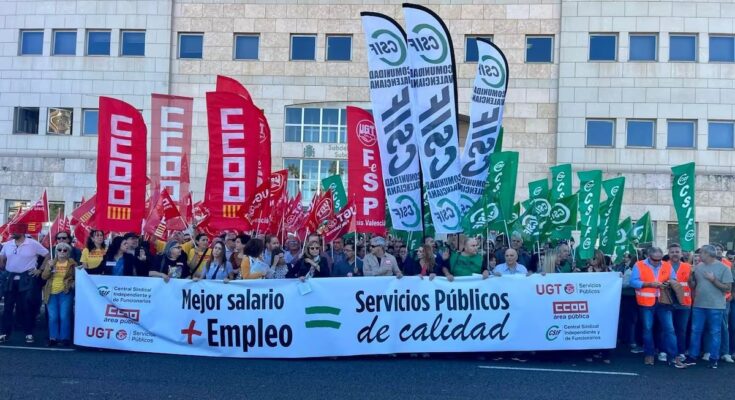On Wednesday, the Ministry of Public Service offered trade unions a salary increase for the 3.5 million public employees of around 10% accumulated for the years 2025, 2026, 2027 and 2028, negotiating sources reported on Wednesday after a meeting between the Government and the public service federations of CC OO and UGT and the CSIF central of public employees. Payments for the current fiscal year will be made retroactively. The sector minister himself, Óscar López, had declared that with his offer he would try to ensure that these workers did not lose purchasing power. According to this offer, however, the increase cannot exceed 4% in the first two years, the same sources clarify. This could mean a slight loss of a few tenths in these first two years compared to inflation forecasts (2.5% for 2025 and 1.7% for 2026, according to the Bank of Spain). However, the cumulative increase for 2027 and 2028, which would be around 6%, could offset this.
This Wednesday’s meeting – the third of this new cycle of negotiations to try to reach a multi-year agreement on wages and employment for administration employees – was intended for the wages chapter and after the offer made by the Public Service to the trade unions, they will have to decide whether to support it or not and give an answer in a meeting to be held this Thursday 20 November, as reported by the Ministry.
CSIF sources reject this first offer which, as they indicate, “does not cover the price increase in 2025 and 2026”. This is why they underline that they will continue to negotiate an agreement that will allow them to recover purchasing power. According to this union, “the Government is collecting more than ever, it has raised the spending ceiling and therefore we think there is room to increase supply”.
In addition to salary increases, other issues related to the design of public job offers are also being negotiated, contemplating the design of human resources plans that determine staffing needs, progressively eliminating the replacement rate, which usually limits these offers to those that occur due to retirement (although there are specific exceptions) and promoting stability (one public employee in three has a fixed-term contract). Similarly, improvements in the mechanisms for accessing public employment are being discussed, promoting the requirement of skills other than memorization processes; as well as the promotion of professional careers in the public sector, with greater offers of specific internal promotion and differentiated from the free shift.
The previous one Framework agreement for 21st century administration agreed by the Government with CC OO and UGT, and to which the CSIF did not adhere, has articulated a salary path and work measures to modernize the public service. Specifically, it provided for cumulative salary increases (up to 9.5% depending on variable conditions) distributed between 2022, 2023 and 2024, with additional clauses linked to the CPI and GDP.
Likewise, this agreement included retroactive payments (part of 2022 applied to payrolls) and review clauses that can trigger further increases, which will be repeated for the increases of these workers in 2025, since public payrolls are frozen during the current year, except for a 0.5% increase paid this summer but which corresponded to what was agreed for 2024. The salary increases were accompanied in this pact with commitments from the Government on working hours. (increase to 35 hours per week), professional classification, partial retirement and employment stabilisation. It also launched negotiations on teleworking, digital modernization and policies to attract and retain talent in public administrations.



